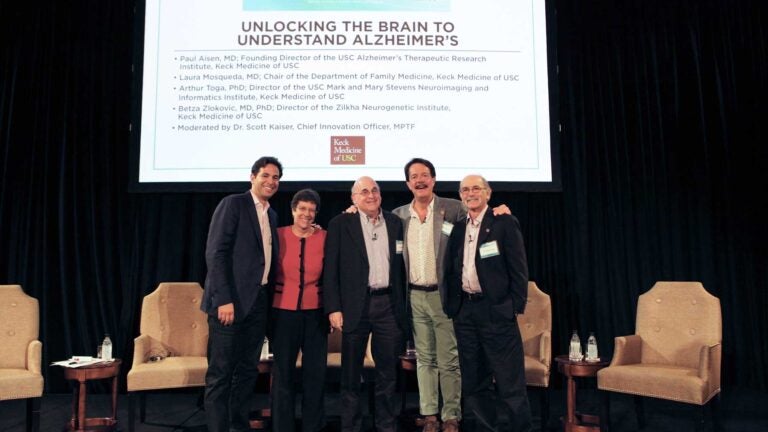
Scott Kaiser poses with Laura Mosqueda, Paul Aisen, Berislav Zlokovic and Arthur Toga, from left, at the entertainment industry conference. (Photo/Leslie Rockitter Photography)
USC ‘rock stars’ of Alzheimer’s research share latest developments
Paul Aisen, Laura Mosqueda, Arthur Toga and Berislav Zlokovic captivate Hollywood movers and shakers with update on USC’s efforts to battle the disease.
An audience of high-powered executives and entertainment industry influencers might not be the most obvious choice for a panel on Alzheimer’s research.
But there they were, 300 women focused intently as four of USC’s leading Alzheimer’s experts — “rock stars in their field,” as panel moderator Scott Kaiser described them — talked about the disease and the latest cutting-edge research. Paul Aisen, Laura Mosqueda, Arthur Toga and Berislav Zlokovic spoke July 30 at the fifth annual Deal With It conference hosted by the Motion Picture & Television Fund.
“We [at USC] act as the hub of these global efforts to combine data that comes from centers and projects around the world, so we can better understand the disease process through biomarkers that chart its progression — and look for opportunities for therapeutic interventions,” said Toga, director of the USC Mark and Mary Stevens Neuroimaging and Infomatics Institute.
It really is a grand challenge for us as a species that we need to solve.
Arthur Toga
“This is a global cooperation among scientists and clinicians around the world because it really is a grand challenge for us as a species that we need to solve.”
Aisen, director of USC’s Alzheimer’s Therapeutic Research Institute, shared insight into potential breakthroughs on the horizon.
“Dementia is the end of a very long story, so we are now taking some of these promising drugs and testing them at the beginning of the story — 15 years before the onset of dementia,” Aisen said. “We believe that this new approach will drastically improve the treatment of Alzheimer’s in the next three to 10 years.”
Zlokovic, whose research is centered on how these blood vessels are damaged by Alzheimer’s disease, explained how the blood-brain barrier breaks down, allowing the disease to progress.
“Sixty-five percent of people age 65-plus have hypertension, diabetes or lipids — all contributing factors to blood-brain barrier breakdown,” Zlokovic said. “But if you control these issues, you dramatically reduce the risk of dementia.”
Four of 70
The four panelists are among the more than 70 experts in neurosciences, medicine and public policy across USC who represent the university’s commitment to addressing the Alzheimer’s epidemic.
After the panel discussion, Kaiser — the Motion Picture & Television Fund’s chief innovation officer — praised the four participants and said it was particularly special for him as a graduate of the Keck School of Medicine of USC.
“Just to see what’s going on at Keck — with the incredible work in terms of the detection and treatment of Alzheimer’s, in terms of improving health and quality of life for those living with disease — was inspiring,” he said.
“For me, it was kind of like doing a panel with The Beatles. I mean, I was really up there with legends, with the rock stars of the field.”



